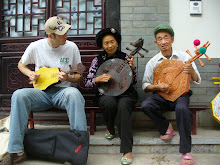This precedent made Gangzi’s style especially striking. Dressed in a red and gold Mongolian robe, he played heavy open-C chords straight out of early 90’s grunge, and in some interludes, slid around the neck as if to conjure a guzheng. His voice built gracefully into Hoomei throat singing, unleashing a harmonic drone that flooded the room like airag. Gangzi had all his bases covered -- the rebellious edge of Seattle, the meditative stillness of the zither, and a vocal style that's claimed by many Mongolians to have originated in the mountains and the lakes.
Well, I thought, I had a number of open afternoons, and if I was going to be learning any songs in the southwest, I’d need need to break away from my suburban-teenager singing voice. So, after the show, I decided to ask him to be my instructor. And as it turned out, Gangzi didn’t have much to do with his weekdays either. He told me to stop by his hutong the following afternoon.
***
There exist two competing camps in contemporary Chinese minority music, and they repel like magnets laid south-to-south. One is the government’s promotion of specific minority traditions -- Miao flutes, Zhuang bronze drums, Hoomei -- to boast China’s diversity and tolerance to the international sphere. The other is the ragtag group of artists who are taking these traditions into their own hands -- the Yi rockers, Uyghur DJs, and self-taught Hoomei singers who do it for the music, not some far-flung political creed.
Now that I’ve had four or five lessons with Gangzi, I’ve come to two conclusions. One is that I’ll never be able to sing like a nomadic herder. The other is that Gangzi belongs firmly to this second camp, and that makes him the best teacher I could ask for. He doesn't talk about it much -- when I asked him why he was initially drawn to Hoomei, he replied, “because it’s awesome, why?” So for now, I'll let the music speak for itself.
(Click on the heading to listen)

No comments:
Post a Comment